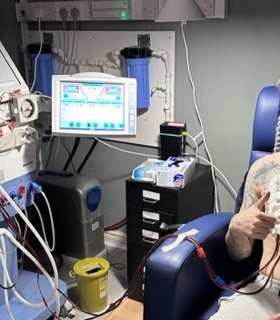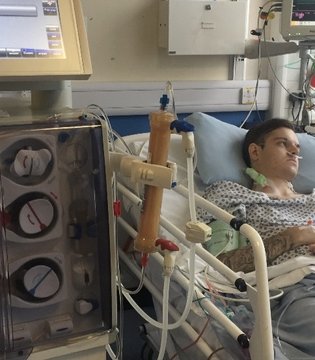"Kids would stare and judge."
"I was about 13 when I was diagnosed with nephrotic syndrome. I’d woken up on a school morning and was swollen head to toe, to the point that I was struggling to breathe, and I was rushed into hospital.
"After the diagnosis, I was started on a six-month steroid treatment, really high dosage. With nephrotic syndrome, you get swelling, but when I was on the steroid treatment it was even worse. At this time, I had been diagnosed with focal segmental glomerulosclerosis (FSGS). The steroids didn’t work, however, so the diagnosis was changed to FSGS and steroid resistant nephrotic syndrome (SRNS).
"Kids would stare and judge. Your appearance changes: your face gets puffy, and you look like you’ve put on weight. Being on medication, especially being a teenager or young adult, is hard. You value your appearance growing up and I feel like I lost a lot of friends when I was going through it all. I was off school a lot and trying to build a social life while managing kidney disease was a big hurdle.
"The way I describe SRNS is, basically, a virus has attacked my immune system which is causing it to damage the cells within my kidneys. They leak a lot of protein, which also causes imbalances in the rest of my body.
"When I was younger, I was more in denial. I thought I would be fine when I grew up. I wish I had accepted back then that SRNS was going to be lifelong. There were times when I rebelled a bit. I wish I had understood from the get-go that I would have to look after myself better.
"I’m happy where I am now, but during the school years I felt like I was quite alone. I wasn’t aware of support like the Young Adult Kidney Group (YAKG). As a kid, I remember thinking that it seemed like everyone with kidney disease was older. I didn’t realise there were other kids going through the same thing, I just stayed in my bedroom playing games. If I could go back now, I would try to look out for other people my age and groups like the YAKG. It helps massively to know that there are other people living with the same challenges as you."
"SRNS is like a full time job."
"There is no simple treatment for SRNS, and there’s no cure for it. I’ve had a lot of people say: 'Get well soon', and as much as you understand that they’re just meaning the best, there isn’t any getting well soon. SRNS is a lifelong thing. I was on peritoneal dialysis and had a transplant in 2019 but about six weeks later the kidney started to lose function. The SRNS and FSGS had reoccurred in my new kidney. I had plasma exchange treatments at least three times a week for about two years until I needed dialysis. I’ve been on haemodialysis ever since. I’ve now trained to do it from home and it’s going really well.
"People think you must have an unhealthy lifestyle if you have kidney disease, but it can affect anybody. Just because you’re fit and healthy, doesn’t mean it can’t affect you. I was a sporty kid – on Saturday and Sunday I was playing football and then on the Monday I got the diagnosis. Kidney disease can get anyone at any time, really.
"SRNS is 24/7 and relentless. There is no break from it and by the evening I am drained by haemodialysis. I’ve said this to couple of mates: think about one of those times you had a week off school or work because you were ill and bed bound and had no energy. That’s what I live with on a day-to-day basis. SRNS is like a full time job."

